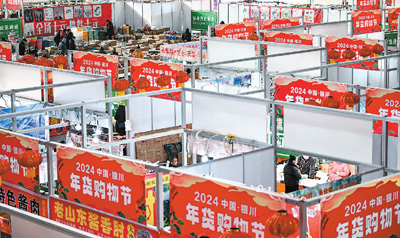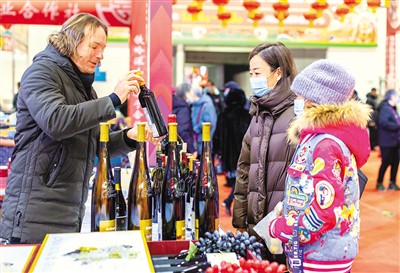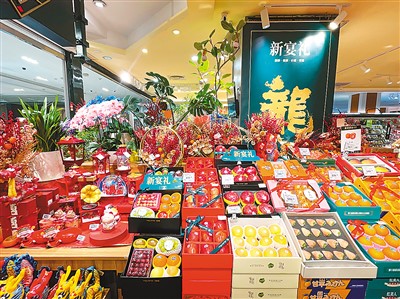Spring Festival boosts consumption of foreign products

Photo shows a scene from a Chinese New Year shopping festival, which will last until Feb. 5, in Yinchuan, capital of northwest China's Ningxia Hui Autonomous Region. [Xinhua/Feng Kaihua]
As the Spring Festival, or Chinese New Year, nears, many cross-border e-commerce platforms and brick-and-mortar stores have launched Chinese New Year shopping festivals, bringing all kinds of quality goods, including foreign goods, to consumers.
Thanks to the development of cross-border logistics and cross-border e-commerce, products for the Chinese New Year in China have become more diverse.
More and more Chinese consumers buy quality imported goods, including gift boxes of nuts, pork, beef and lamb, as well as seafood, for the upcoming Spring Festival.
At a store of Hema Fresh, Alibaba's fresh-food chain, in Beijing, a woman surnamed Cui was choosing king crabs from Russia. Every year, the king crab is an essential dish for the New Year's Eve dinner in her family, according to Cui.
Deep-sea seafood like Norwegian salmon, whiteleg shrimp from South America, king crab, and tiger prawn from Thailand, as well as gift boxes of globally-sourced pork, beef and lamb including Black Iberico pork from Spain, Angus Ribeye steak from Australia have become popular among Chinese consumers.
Mirrorless interchangeable-lens cameras, musical instruments, and outdoor sports gear have become popular products for this year's Spring Festival for post-95 consumers.
An executive of China's trendy e-commerce App Dewu said sales of guitars, mirrorless interchangeable-lens cameras, and sports equipment on the platform have increased nearly two times, over fivefold, and several times or even tenfold, respectively, since January 2024.

Customers purchase wine from France at a Chinese New Year shopping fair in Hohhot, capital of north China's Inner Mongolia Autonomous Region. [Photo/Ding Genhou]
"Young consumers favor trendy products for the Spring Festival," the executive said, adding that nearly 10,000 pairs of a type of "Year of the Dragon" sneakers by Nike were sold on the platform shortly after its launch.
Many Chinese consumers choose imported products as Spring Festival gifts.
"The popularity of imported goods for the Chinese New Year is a microcosm of China's growing demand for imports," said Dong Chao, director of the institute of circulation and consumption of the Chinese Academy of International Trade and Economic Cooperation.
According to Dong, the popularity of seasonal imported fruits, selected dried goods from classic places of origin and limited-edition high-end alcoholic beverages reflects a significant growth in high-end food consumption.
"Quality imported products have entered the daily lives of Chinese people," Dong added.
An online Chinese New Year shopping festival has been launched by the Ministry of Commerce (MOC) in collaboration with the Office of the Central Cyberspace Affairs Commission, the Ministry of Industry and Information Technology, and other relevant departments.
The event, lasting from Jan. 18 to Feb. 17, features online sales promotion activities in various regions, e-commerce platforms and merchants.

Photo shows a zone for Chinese New Year goods in a supermarket in Beijing. [Photo/Tang Min'an]
According to data of major e-commerce platforms monitored by the MOC, nationwide online retail sales on the first day of the online shopping festival reached 50.95 billion yuan ($7.17 billion), up 12.7 percent compared to the first day of last year's event.
"During the event, platforms have adopted multiple measures to boost consumption, which is conducive to fully stimulating the consumption potential," Dong said.
"While maintaining large-scale promotions this year, the event also places greater emphasis on cultural connotations and brand significance, and adapts to market changes to satisfy the consumers' tastes," Dong added.
JD Worldwide, the platform for imported products of Chinese e-commerce giant JD.com, concurrently commenced this year's Spring Festival shopping activities, offering rebates, and 50 percent off for imported Spring Festival gifts, as well as livestream activities.
"Low price" has been a keyword for the Chinese New Year shopping festivals of Alibaba's Taobao and Tmall. For instance, Taobao kicked off a 10-billion-yuan subsidy campaign, covering imported products like Chilean cherries and shrimp from Ecuador.
Various regions across China are also holding import-themed Chinese New Year shopping festivals.
A shopping festival kicked off recently in Yiwu, east China's Zhejiang Province. At the Yiwu China Imported Commodities City, the main venue of the ongoing shopping festival, customers can purchase 150,000 kinds of products from over 100 countries and regions. The main venue offers sales promotions and various featured activities.
In south China's Guangxi Zhuang Autonomous Region, a parallel session of this year's online Chinese New Year shopping festival was launched recently. In collaboration with the consulates general of Cambodia, Laos, Malaysia, Myanmar, Thailand and Vietnam in Nanning, capital of Guangxi, the event offers sales campaigns for imported products from ASEAN members and members of the Regional Comprehensive Economic Partnership (RCEP).
























